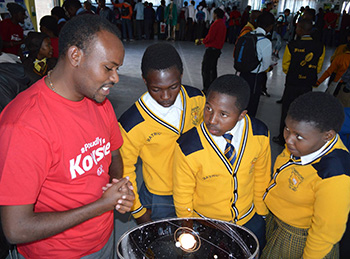Latest News Archive
Please select Category, Year, and then Month to display items
02 January 2025
|
Story Gerda-Marie van Rooyen
|
Photo Supplied
 Leading the research in South Africa is Prof Linus Franke from the Department of Soil, Crop and Climate Sciences.
Leading the research in South Africa is Prof Linus Franke from the Department of Soil, Crop and Climate Sciences.
Scientists are actively pursuing the successful breeding of diploid hybrid potatoes from inbred lines. This is expected to revolutionise potato breeding as it holds the key to rapid genetic progress. It will introduce new varieties for commercialisation through seed. Currently, existing potato variants have a gene that renders self-pollinated seeds infertile.
Prof Linus Franke, an academic in the Department of Soil, Crop and Climate Sciences at the UFS, is leading the research in South Africa. “This technology allows the production of genetically uniform potato seed that is easy to transport and largely disease-free.” He says this differs from conventional breeding whereby only vegetative propagation is possible due to tetraploid varieties in potatoes. It also risks carrying pests and diseases from one generation to the next – leading to the accumulation of pests and diseases with each round of multiplication.
Seed innovation
Prof Franke explains that Solynta BV, a seed company based in the Netherlands that produces potato varieties that can be grown from seed, has included South Africa in their research efforts because it is one of Africa’s largest producers and exporters. Through his academic relationship with Wageningen University and Research, a Dutch institution renowned for its agricultural endeavours and food production, the UFS became involved in researching hybrid potatoes grown from seed.
Diploid seeds containing two sets of chromosomes allow easier gene manipulation to increase predictability and speedier genetic progress. The breeding approach enables the incorporation of tolerance to pests, diseases, abiotic stresses (cold, heat, drought) and other desired genetic traits.
Although Prof Franke is optimistic about this research, he is not blind to disadvantages. “Potato seeds are tiny and have little energy reserves, making it harder to grow potatoes from seed than from tubers.” He says potatoes from seed will take longer to cultivate than tubers, as farmers need to grow plantlets from seeds first, adding six weeks to the growing period. “It is possible that commercial farmers can grow potatoes directly from seed. Alternatively, perhaps more likely, specialised growers will produce tubers of potatoes from seed; these tubers are then sold as seed tubers to other potato farmers, who then continue their normal practices of producing potatoes for the market from tubers.”
Financial benefits
Prof Franke says farmers have reason to get excited. “Seed potatoes will reduce input costs, as varieties with enhanced tolerance to pests and diseases require less pesticides. Planting one hectare of potatoes requires three to four tonnes of potato tubers, but only one 25 g packet of potato seeds.” Since potatoes are a more valuable commodity than maize, this technology might also increase farmers’ income potential.
Prospective Kovsies advised to respect themselves
2015-05-22

|
Thousands of prospective Kovsies had a brief but unforgettable experience of being a Kovsie when they descended on the Qwaqwa Campus for the Open Day on 16 May 2015.
They came from all over the Thabo Mofutsanyana District, and from as far as Ladysmith in KwaZulu-Natal.
“You are special,” was the message from Dr Choice Makhetha, Vice-Rector: External Relations.
“Each one of you is very special, and don’t allow anyone to tell you otherwise,” said Dr Makhetha.
“Each one has a brilliant mind and you can achieve anything you set your mind to. This can only happen if your thoughts and whatever you say to yourself are positive all time.”
The learners were also reminded to take themselves seriously, and to always respect themselves.
“It is important that you must have respect for yourself, for others, and for the environment. When you respect yourself, you respect time. You must make it your business to know and read extensively,” she said.
After the formal programme, learners were exposed to different study programmes and student services by visiting various faculties and departments.
The programme included messages of support from the Campus Management and the SRC. Entertainment was provided by a South African hip-hop group, Skwatta Kamp, a student ensemble called Unspoken, and a breathtaking laser show.